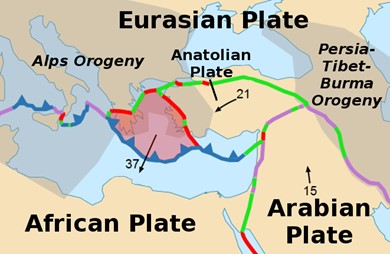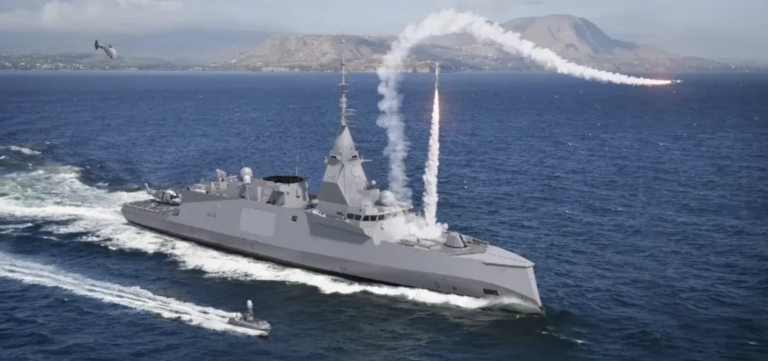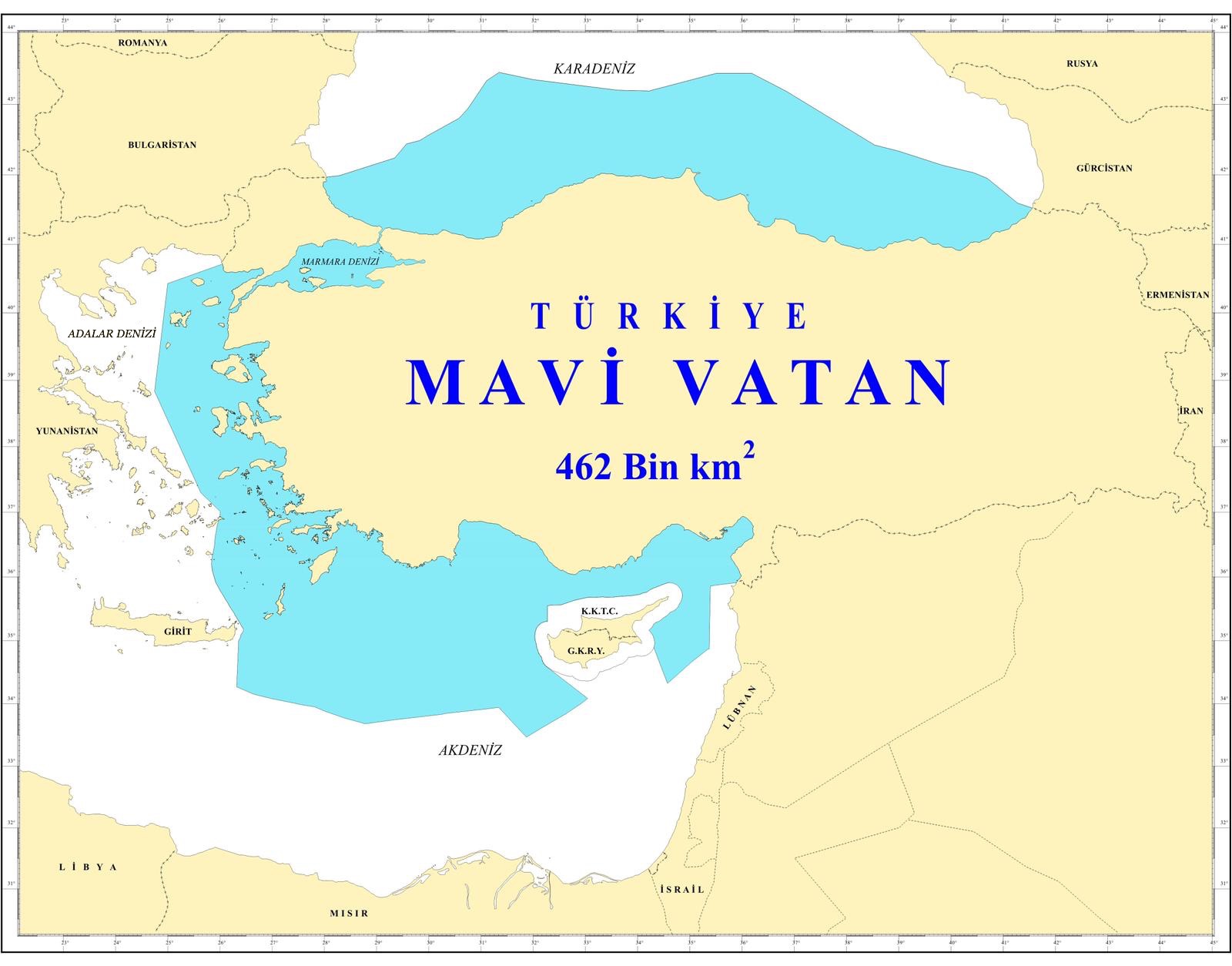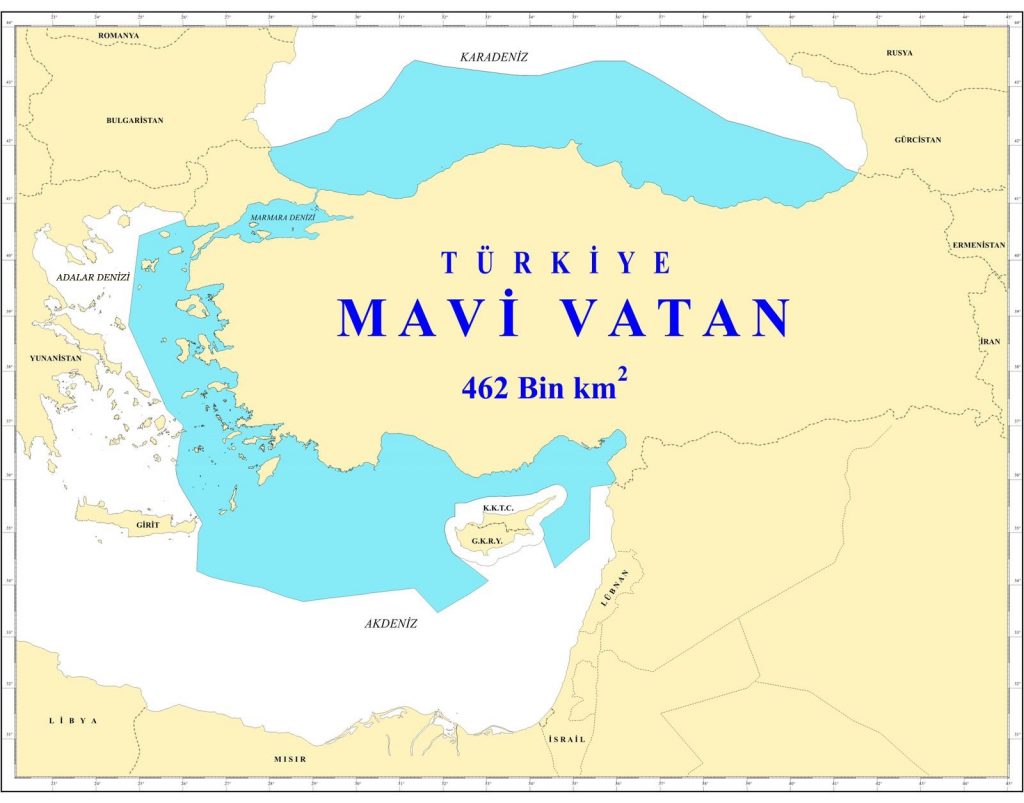By Georgios Kalafikis, Ph.D.
Greece should always and suitably repel Turkey’s expansionist claims (in whatever form or frequency) against Greek land, sea, and airspace before the eyes and minds of the international community, for two reasons: first, the current Greco-Turkish confrontation and dispute in addition to the technicalities of the negotiations is also a matter of publicity and facts; secondly, because the Greek side may now reveal the magnitude of the Turkish threats against Hellenism in Greece and Cyprus. In this protracted and persistent “war of words” the Greek side behaved quite subduedly and lagged behind the Turkish side in sharpness, thus leaving many Turkish allegations and provocations unanswered. Still, there is scope for improvement in this area of controversy. Confronted by such a kind of neighbor, Greece should leave nothing unanswered, nor “grey zones” lurking in the information of the international community as a result of the Turkish propaganda! Hence, we underline and attempt to disprove the following top claims and theories by which Turkey justifies its policy against Greece in the Aegean Sea from 1973 onwards:
1) “All Greek islands of the Eastern Aegean constitute an extension of the Anatolian Plate; hence, they settle on a potential Turkish continental shelf and they are not entitled to any of their own”. That is the “archetypal” though “primitive” Turkish claim! In principle, Turkish officials assert that any land territory is superior to any island territory as regards the delineation of the continental shelf and the Exclusive Economic Zone (EEZ) between them. That is a false and unscientific sophism because it simultaneously constitutes a perversion of two sciences, Geology and International Law. First, the concepts of the “continental shelf” and the “tectonic plates” cannot be adjoined in the inaccurate manner of the Turkish side, nor can they be connected according to the aspirations of the Turkish establishment! According to Geology, the “Anatolian tectonic plate” does not protrude into the Aegean Sea; on the contrary, the “Aegean or Hellenic tectonic plate” includes the Turkish coastline of the Aegean and extends further into western Anatolia (Asia Minor).

Secondly, according to the “United Nations Convention on the Law of the Sea” (UNCLOS), every juridical island is entitled to a continental shelf and an EEZ in equal principle with any other corresponding mainland, besides the legal territorial sea of up to 12 nautical miles. The UNCLOS treaty and the relevant decisions of international tribunals cannot be invoked a la carte by a non-contracting state, such as Turkey, which not only hasn’t signed it yet but still rejects it as an instrument for interpreting the Law of the Seas.
From a geological and a legal perspective, neither the “Anatolian Plate” reaches the Aegean nor the western Aegean coastline of Turkey is entitled to a continental shelf protruding substantially into the Aegean Sea because the numerous inhabited Greek islands of the Aegean Archipelago are invariably scattered in-between mainland Greece and mainland Turkey, thus essentially blocking Turkey’s access to the core of the Aegean basin. Therefore, Geography, State Borders, and International Law restrict Turkey’s maritime access and limit its sovereignty de jure and de facto only to a “shallow” part of the Aegean Sea across the western coast of Anatolia.
In the best-case-scenario for Turkey, even after international arbitration and according to the current territorial status quo, the Aegean Sea would probably remain a “Greek lake” because the interposition of hundreds of inhabited Greek Aegean islands could only allow for some local Turkish maritime re-entrants into the Aegean Archipelago, in a few sea areas beyond the Greek territorial waters. That’s why, quite recently, Turkey has also raised a sovereignty issue and question for all the islands belonging to its otherwise “NATO ally” Greece in the Eastern Aegean, extending from Samothraki down to Kastellorizo, whether small or large, uninhabited or inhabited, big islands or rocky islets. Turkey holds only trivial ground (islands and islets) to support and achieve an expansion of its maritime zones much deeper into the Aegean according to the established and still-in-force international treaties and conventions (the 1913 Bucharest Treaty, the 1914 London Convention, the 1923 Lausanne Treaty, and the 1947 Paris Treaty), so Turkish officials officially circulate the non-existent hypothesis of the supposedly “gray zones” of island sovereignty in the Aegean Archipelago. Thus, Turks intend to isolate and “neutralize”, or they threaten to use military force against the Greek islands of the Eastern Aegean so that their maritime zones may reach the desired depth according to their aspirations.

2) “Greece systematically violates the internationally recognized demilitarized status of the Eastern Aegean islands; because of this violation Turkey may challenge Greece’s sovereign titles to the Aegean islands and the rights of these islands to maritime zones of their own”. In our opinion, these are mock arguments. Ab initio (first) and in principio (foremost, in principle), in none of the international treaties, which describe and define the territorial sovereignty in the Aegean islands, the Greek sovereignty depends on or was granted under the clause of a “demilitarization”. Nor the so-called “demilitarization” status (where, as and if applicable) was set as a prerequisite for the recognition of Greek sovereignty in the Aegean islands conceded to Greece, namely those that are far from 3 miles from the Turkish coastline of the Aegean (except Imbros, Tenedos, and the Rabbit Islands, which remained under Turkish sovereignty). Finally, it is both a legal and a logical distortion to allege that alongside sovereignty Turkey may also challenge the rest of the rights of the Greek islands in the Aegean regarding all (!) their maritime zones (that is, the Greek national territorial sea, the potential continental shelf, and the EEZ)! Even a non-lawyer or a first-year law student can perceive the flimsiness of the aforementioned Turkish arguments and legal claims. Then, what’s the point for Turkish officials to circulate such defective assertions if they understand that these claims would be refuted and dismissed in any international court of justice? Because, in our opinion, the above Turkish positions do not constitute legal argumentation, but covert, though direct, threats against the territorial integrity of Greece.
Contrary to the above Turkish assertions, the Greek counterarguments are well-founded from every point of view (legal, and so on). It is worth adding one more syllogism in favor of the Greek positions, which is curiously still absent from the Greek quiver. From the moment Greece, like Turkey, de jure joined the NATO military alliance as a full member without any exceptions or “asterisks” (1952), all previous provisions of the international treaties on the limited “militarization” (1923 Lausanne Treaty) or the complete “demilitarization” (1923 Lausanne Treaty, 1947 Paris Treaty) of the Greek islands in the Eastern Aegean became implicitly though de facto inactive.
Otherwise, what would be the point and value of full membership in a defensive military alliance when large portions of the territory of an allied country would remain under a regime of partial or full demilitarization, hence considered also as areas for a limited deployment of military forces? What kind of a defensive umbrella could the NATO alliance “fully” provide, and how exactly could NATO “fully” defend and protect a “partially demilitarized and defenseless” allied country? Isn’t it inherently incompatible for a “military alliance” to bear “extended demilitarized zones” on the territory of one of its member-states?
Consider for a moment the following paradox: the mutual defensive zone of NATO’s southeastern flank running through Greece and Turkey from the Turkish border in the Caucasus to the Greek islands in the Ionian Sea and almost at the “joining point” of this common defense area a misplaced “partial or complete demilitarized zone” existing from Samothraki in the north to the Dodecanese in the south! Does anyone honestly think this makes sense: the absurd notion of a “military vacuum” that disrupts the cohesion and tears apart the defense of the entire southeastern flank of NATO?
Finally, we point out the best riposte – according to our opinion – against Turkey’s illusion on the issue: whereas, according to the Potsdam Conference and the accompanying agreements (1945), the defeated in WW II and unconditionally surrendered Germany was fully demilitarized, in the end, both post-war German states (West Germany and East Germany), were fully militarized de facto once they joined the two rival alliances, NATO and the Warsaw Pact respectively. Therefore, the same should be considered to apply de facto for Greece though a completely different case compared to Germany.

Turkey’s unsubstantiated claims about the military status of Greece’s Eastern Aegean basin become even more frivolous if someone takes into consideration the fact that during the 1950s and the 1960s the USA, Greece, Turkey, and several other NATO allies conducted large aeronautical and military exercises (for example, “Operation Longstep”) in Greek, Turkish and international waters in the Aegean Sea (in the Gulf of Smyrna, the Chios Straits, or on the sea and shorelines of the Northern Aegean)! After all, according to NATO (I quote): “the defence of Greece’s northern border was crucial, so was that of its endless coastline and myriads of islands”; so, “NATO created” “a military command called Allied Land Forces Southeastern Europe (LANDSOUTHEAST) […] responsible for an area that stretched from the Caucasus to the western shores of Greece”! So, as early as 1952, NATO de facto canceled the partial or complete demilitarization of those “partially or fully demilitarized” island regions of Greece.
Therefore, the selective memory of Turkish officials aims not at enlightening but at distorting events and facts, as well as misinforming and deceiving foreign officials, various international organizations, and the public opinion of the world. Now that Russia has turned again into a “strategic opponent” of NATO, it is perhaps an opportunity for the Greek government to issue a note verbale to remind that Greece was admitted into the NATO alliance for securing the defense of its whole territory on land and in the seas, and to reiterate that the “militarization” of the Aegean Greek islands provides a “strategic depth” to the defense of the southeastern flank of the Alliance, at whose disposal the Greek military forces stationed there will be placed whenever needed! Moreover, it is worth skillfully emphasizing to the rest of our NATO allies that Turkey’s objections and claims against Greece on this particular issue, not only do not serve the Alliance’s interests but instead aim ultimately at weakening the defense of NATO’s southeastern flank.
3) “An expansion of Greek territorial waters as well as a possible declaration of a Greek EEZ in the Aegean and the Eastern Mediterranean will lead to the maritime blockade, and also to the geostrategic and economic strangulation of Turkey”. Yet another flawed argument, in our opinion. A random look at the MarineTraffic site, for example, at any given time shows that the maritime traffic in the Aegean is mainly channeled through the Greek territorial sea from the Straits of Kafireas down to Cape Tainaro, as well as along the territorial waters on both sides of the sea borderline between Greece and Turkey. These passages are preferable even by all kinds of Turkish ships.

International Law and conventions explicitly provide for smooth maritime traffic worldwide. It even enables foreign merchant vessels and military ships of various types to make either an “innocent passage” or a “transit passage” through national territorial waters of other foreign countries (cf. the relevant chapters and articles in the 1982 UNCLOS treaty). As a result, the bulk of international shipping already passes through national territorial seas across the whole world without hindrance or obstruction whatsoever.
Until very recently, Greece had been the only (!) country in the world to possess a ubiquitous territorial sea of just 6 nautical miles strictly and only measured by the shorelines and not by applying “straight baselines” after designating its many bays and gulfs as “internal waters” or “historic bays” (at last, Greece used those methods for the enlargement of the Greek territorial waters in the Ionian Sea. It is worth mentioning that “straight baselines” increase the outline of the coastlines and also expand the starting basis for the calculation of the territorial waters, thus enlarging the territorial sea). Moreover, Greece is, unfortunately, the only (!) country worldwide to bear an official and perpetual threat of a “casus belli” formally declared by Turkey – an otherwise NATO “ally” – in case Greece legally extends its Aegean territorial waters from 6 to 12 nautical miles, a right provided by international conventions without impeding the maritime traffic and the global navigation in any way.
The possibility of a unilateral but legal extension of the Greek territorial waters to 12 miles in the Aegean through “straight baselines” as well as by designating most Greek gulfs as “internal waters” or “historic bays” would automatically put an end to the Aegean Question. Then, the Greek territorial waters/territorial sea would cover approximately ¾ (75%) of the total area of the Aegean basin; hence, only a few parts of the Aegean would remain in a “High seas” status and potentially dividable between Greece and Turkey. That’s the key reason for the existence of the illegitimate Turkish casus belli against Greece.

In reality, a friendly and cooperative Turkey has nothing to fear because Greece has neither the intention nor the capacity to block Turkey’s exit to the High Seas by exercising a blockade in the semi-enclosed Aegean Sea, in turn, a part of the enclosed Mediterranean Sea. Being a country that habitually abides by International Law and a maritime nation that considers the “Freedom of the Seas” as a vital “national interest”, Greece has already explicitly declared by signing the UNCLOS that (quote) it “has the responsibility to designate the route or routes” for “the international navigation” through its “numerous spread-out islands” that often “form a great number of alternative straits” to apply “in practice” all relevant articles of the UNCLOS. Indeed, that’s what Greece is doing and permitting anyway (cf. the MarineTraffic screenshot). Therefore, Turkey’s retrospective fears only reflect its malicious aims against Greece, as we shall demonstrate next.
4) Finally, the very theory and policy of the so-called Turkish “Azure Homeland” (Mavi Vatan) is offensive through a simple juxtaposition to the map. Such a hypothetical, intolerable to Greece and Cyprus, Turkish EEZ would “engulf” hundreds of Greek islands and almost the entire Cypriot EEZ! The possibility of the Aegean Greek islands and Cyprus merely “floating” upon a “Turkish” sea is unrealistic beyond any reasonable doubt. A possible “encapsulation” of several hundred densely packed foreign islands into a foreign EEZ is a fallacy by definition in stark contrast to any principle or provision of International Law. Such likelihood becomes an illusion because in International Law no regulation exists that allows for a foreign opposite or adjacent coastline to extend its EEZ over and beyond a whole foreign chain of islands. That would be to the detriment of all the intermediate foreign islands. Practically, whole clusters and groups of Greek islands would be separated and cut off from the rest of the Greek national territory, even though they are geographically inseparable from each other and the Greek mainland.
That’s why the “sea blockade” that allegedly Turkey is afraid of being imposed by Greece is what Turkey aspires to impose on Greece instead! Exactly how? By precisely aspiring to close off all the Greek islands up to the middle of the Aegean and even Cyprus within an enormous “Turkish territorial sea, continental shelf and EEZ”, Turkey’s “Azure Homeland”. Therefore, Greece may condemn the Turkish strategic plans for expansion even by associating the “Mavi Vatan” with Italy’s “Mare Nostrum” and Germany’s “Lebensraum”!

To sum up, the implicit and explicit goal of 21st-century revisionist Turkey is to absorb Greek seas, land, islands, and airspace. That is the essence of the contemporary Greco-Turkish utterly problematic and quasi-hostile relations. Another graphic – though strangely neglected – detail aptly reveals that the Greek Aegean islands do not even enjoy the right to the minimum legal territorial sea of 6 nautical miles in all the Turkish “Mavi Vatan” maps! So, according to the Turkish fallacious and expansionist intentions, they already seem to belong to Turkey proper!










